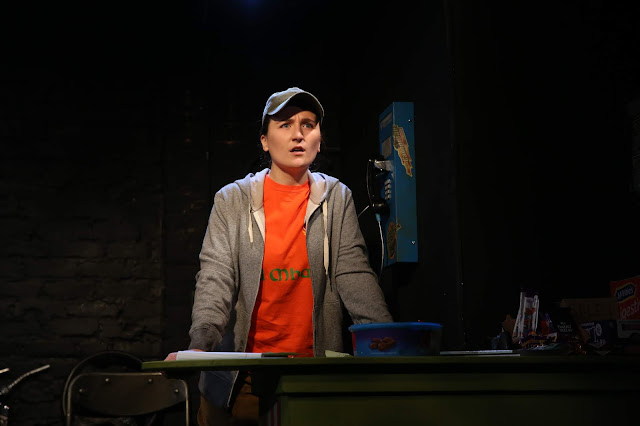“Aggrieved, Arrogant, and Abused”

 “Toxic masculinity” is a phrase we nowadays hear over and
over. Director Nicola Murphy, who helped mold three masterful performances in Abbie
Spallen’s Pumpgirl, in the Irish Rep’s intimate Scott W. McLucas Studio
Theatre, uses it to describe the play’s world, noting “how it affects men and
women, and how complicated recovery can be for both victim and abuser.” This is
certainly true of Spallen’s play, set in Newry, a small, dead-end town near the
southern border of Northern Ireland, but it’s hard to pin all the toxicity in
this darkly dreary, rural world on its masculine component.
“Toxic masculinity” is a phrase we nowadays hear over and
over. Director Nicola Murphy, who helped mold three masterful performances in Abbie
Spallen’s Pumpgirl, in the Irish Rep’s intimate Scott W. McLucas Studio
Theatre, uses it to describe the play’s world, noting “how it affects men and
women, and how complicated recovery can be for both victim and abuser.” This is
certainly true of Spallen’s play, set in Newry, a small, dead-end town near the
southern border of Northern Ireland, but it’s hard to pin all the toxicity in
this darkly dreary, rural world on its masculine component.  |
| Clare O'Malley, Hamish Allan-Headley. All photos: Carol Rosegg. |
 |
| Labhaoise Magee. |
Hammy (Hamish Allan-Headley), who wears a flashy, racing
driver’s jacket (spot-on costuming by Molly Seidel). is a raucous, foulmouthed,
hard-drinking, devil-may-care egotist who works in a chicken hatchery and gets
his kicks driving in stock car races. Given to quoting Queen lyrics, his reckless style has earned him the label “No-Helmet” Hammy. Married, with
two kids, he carries on with Pumpgirl, who, despite her appearance, seems
thoroughly heterosexual.
 |
| Hamish Allan-Headley. |
And then there’s Sinead (Clare O’Malley), Hammy’s much put-upon,
largely-ignored, attractive wife, who has a palpable distaste for Hammy’s
presence, and finds herself obsessively entwined in an affair with Shawshank, an ex-con, quotation-spouting, drinking buddy of Hammy's, despite his unappealing looks. 

Events coalesce following a shocking act of sexual violence: betrayal, guilt, potential murder, and reckonings ensue.
 |
| Clare O'Malley. |
The McLucas’s interior—sharply lit by Michael O’Connor—has
been completely rearranged by Yu-Hsuan Chen to provide a wide performance area,
with an aisle runway. At our left is a double-bed, standing vertically, from
which Clare often speaks. Nearby is her kitchen area. Toward center is a car seat,
the focus of much of Hammy’s activity, especially when he’s racing, his unprotected noggin knocking against the invisible window. And at our right is the cashier’s counter and petrol pumps belonging the station where Pumpgirl, who also changes oil,
does her thing.
Spallen, however, hasn’t written a conventional play but,
instead, a series of interlinked monologues in which the
characters tell their stories, speaking other people’s words when necessary,
a literary device not unfamiliar in other recent plays. The Irish Rep itself was
the venue for such a play, Little
Gem, just this past August, while the Keen Company did Molly Sweeney two
months later.
 |
| Hamish Allan-Headley, Labhaoise Magee. |
Much as it has its value in providing actors with richly
rewarding opportunities, the device isn’t always able to sustain interest over the
course of the play's two-hours and five minutes, although it regains momentum
as it barrels toward its second-act conclusion. Theatre is theatre, not oral
interpretation, as exemplified by the two brief moments in Pumpgirl where
the characters momentarily relate to one another.
As in much other Irish writing, the colorful language is as
much a dramatic component as any of the plot elements. Spallen is exceptionally
adept at writing colloquial speeches, embedded with profanities, using stunningly
apt metaphors that nonetheless sound as if they could have been spontaneously created
by these unschooled characters. A simple example is when Hammy, rescued from a
burning car by being doused with a fire extinguisher, declare that “It’s
like being spunked by an elephant.”
The images are mostly unpleasant, cruddy ones, capturing the
mundane feels, smells, sounds, and sights we daily experience, like the pieces
of food lodged in seat cushions, or a husband’s rancid breath, or the noise of
snoring. Spallen weaves them into a poetic prose that piles one atop the other,
many spoken so fast and in such thick brogues you sometimes miss
the forest for the trees.
 |
| Labhaoise Magee. |
Magee, Allan-Headley, and O’Malley offer headily intense, emotion-packed,
viscerally magnetic performances. You may not catch every word but you can’t help but be moved by the depth of conviction of the aggrieved Sinead, the arrogant Hammy, and the abused Pumpgirl. When the latter delivers a wrenching monologue
toward the end, the tears streaming down her face, some visitors may have a hard time keeping their own cheeks dry.
Irish Repertory Theatre
132 W. 22nd St., NYC
Through January 22
